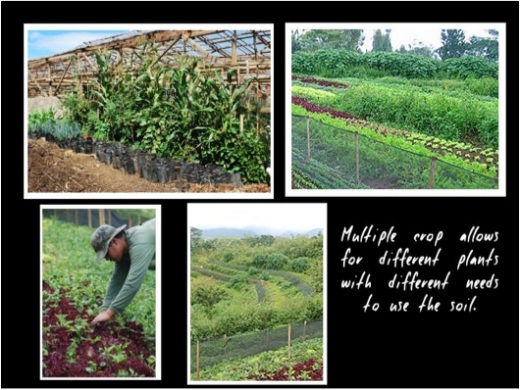This is the 2nd of a series on Backyard Farming. This article will give you tips on a garden plan, what to grow, crop rotation and multiple cropping.

What to plant? What you plant will depend on: (1) What you need; (2) Where you are; (3) The needs of the plant; and (4) How much time and patience you have. If you want easy vegetables, here’s an old article: Easy Vegetables to Grow in the Tropics. Remember that there are crops that you can plant in the lowlands, and crops that will only grow in lower temperature or in the highlands.
CROP ROTATION
We practice crop rotation in our farm and in our kitchen garden. This means you plant different kinds of vegetable in your garden bed every cropping season. Why? Crop rotation will prevent pests and diseases from building up in your soil. If you keep planing one kind of vegetable in the same bed every time, you will be attracting the pests and diseases that are common to that plant. These pests and diseases will then keep building up on your soil. However, if you rotate your crops, you will have a different set of vegetables that do not interest the pests/diseases from the last crop.
Another reason for crop rotation is that different crops have different demands on the soil. For example, salad greens, tomatoes or eggplants are heavy feeders. Carrots and root crops are light feeders. Planting legumes will add nitrogen to your soil. A crucial part of biodynamics is the need to allow nature to follow its own pace and not force growth or impede it. Do not try to force the soil to produce as much as it can just because it can. Thus, alternate the vegetables you plant to allow the soil some breathing space in between crops.
Some tips: Follow Give and Take in succession.
- Cabbage plants are heavy feeders. They are TAKERS. Do not plant them on the same plot one after another.
- Fruit crops need plenty of compost but very little nitrogen. They are moderate takers.
- Root crops and legumes require very little fertilizer. They are GIVERS. They actually ADD nitrogen to your soil. In our farm, we use legumes for the nitrogen-fixing qualities. We plant the legumes and then cut them leaving the roots under the mulch. (Note that one hectare of legumes can fix up to 500 kilos of nitrogen per crop.)
The roots of legumes also have other micro organisms that destroy pathological bacteria in the soil.
- Foliage crops need plenty of nitrogen and compost. They are TAKERS.
-
Following biodynamic farming, you should be inter-cropping leafy vegetables with root vegetables and legumes.
DO NOT:
- Plant the same veggies in the same bed in succession.
- Have cabbage crops succeed each other
MULTIPLE CROPPING

Another practice we follow is multiple cropping. On the same bed, we plant vegetables that support each other. Some plants may house beneficial insects, which the other plant needs to control pest. They ward off each other’s bugs or thrive well together. You can also use companion planting to make better use of your soil or so you have windbreaks that protect sensitive crops.
Some tips:
- Marigolds emit a strong fragrance that confuses pests. You can plant marigolds all over your garden. They are pretty too!
- The strong aroma of herbs like dill, rosemary or thyme also repels pests and attracts predators (insects that eat pests) and pollinators.
Next article: Growing your Garden: preparing your beds, mulching, sowing, nursery and transplanting.









Posted by Ecological Pest Management | Our Farm by Earth Flora Inc. on May 28, 2013 at 9:44 am
[…] Crop rotation will keep your soils healthy too. Make sure that plants and not planted on the same spot every time. Multiple cropping or companion planting also helps rid you of pests and diseases. Multicropping and Crop Rotation will provide a continuous source of food and encourage beneficials insects to remain in your bed. See article on Crop Rotation and Multiple Cropping. […]
Posted by Mel on July 14, 2013 at 11:45 pm
Hi. I wud like to know mre about farming. Do u have seminars i can go to?
Posted by oysteronahalfshell on July 15, 2013 at 5:35 pm
Hi Mel. Yes, there’s a workshop on August 3 and 4. Here’s the link” https://flowerdepot.wordpress.com/2013/07/11/backyard-farming-workshop-this-august/ Hope you can join us.
Posted by oysteronahalfshell on February 16, 2016 at 10:54 am
Hi Mel. Thank you for your patience. We are having a Backyard Farming Workshop for March. You might still be interested. We look forward to having you!
Posted by Meng on November 16, 2015 at 12:33 am
Hi. Do u still have farming seminar/workshop? I’m want to learn about sustainable and organic farming/ gardening. Thank you.
Posted by oysteronahalfshell on February 16, 2016 at 10:54 am
Hi Meng. Hi Mitch. Thank you for your patience. Below is the link for the Backyard Farming Workshop. You might still be interested. We look forward to having you!